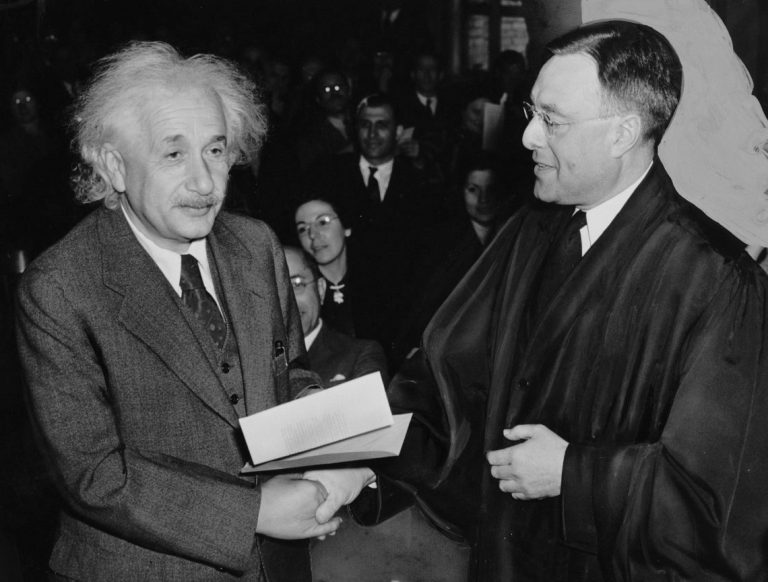Today let’s do three substantial topics, and push items about politics and religion to the end. To the fringe.
- Einstein’s 7 rules for a better life;
- A peculiar Guardian article about arranging “curated” books;
- Adam Lee on religious taboos and who owns the Moon;
- Fringe items about those who would revive the climate of driving those who get outed to commit suicide; how Republicans claim they’re not sexist but are disinclined to vote for women; how Trump is God’s will but Biden isn’t.
**

Big Think, Ethan Siegel, 16 Jan 2024: Einstein’s 7 rules for a better life, subtitled “The most celebrated genius in human history didn’t just revolutionize physics, but taught many valuable lessons about living a better life.”
Key Takeaways
• With scientific discoveries like the constancy of the speed of light, the photoelectric effect, E = mc², and general relativity, Albert Einstein is rightly known as one of humanity’s greatest geniuses. • However, his fame and renown extended far beyond the field of physics, as Einstein played major roles in politics, media, and even the everyday affairs of life. • From his letters, correspondence, and from the personal accounts of those with whom he interacted, a fascinating set of rules for life can be gleaned. Here are some of his best lessons.
So… this is someone’s (Ethan Siegel’s?) derivation of Einstein’s “rules,” not something Einstein ever wrote down himself. Still, an interesting list. See article for expansions on these points.
- Rule #1: Expend your efforts on the things that matter.
- Rule #2: Do things you love, even if you’re terrible at them.
- Rule #3: Have a puzzle mindset.
- Rule #4: Think deeply, both long and hard, about things that truly fascinate you.
- Rule #5: Don’t let politics fill you with either rage or despair.
- Rule #6: Blind obedience to authority is the greatest enemy of the truth.
- Rule #7: Science, truth, and education are for everyone, not just the privileged few.
It says at the bottom “The quotes contained within were curated and lifted from Benyamin Cohen’s new book, The Einstein Effect, and this piece contains affiliate links to that book.” So that would be the source, not Siegel’s own research. The article illustrates each of these points in general, and with how they applied to Einstein’s life. I suppose I could do the same, in my own limited way. I certainly am mindful of #6, and think this tendency among most people could be the downfall of civilization, and I try to be conscious of #5, even though it is so easy to make fun of the MAGAites, and at the same time, be worried about their blind obedience to authority.
Actually, these items fit into my recent resolve to downplay the political and religious comments that I tend to highlight in my posts, in favor of more substantial, positive items. As I’m doing today. One gets too worn down by trying to account for all the idiocy in the world.
\\\

The Guardian, Tim Dowling, 17 Jan 2024: Shelf-absorbed: nine ways to arrange your bookshelves – and what they say about you, subtitled “Whether you alphabetise your books, hoard them or make sure your most intellectual tomes are in sight for Zoom calls, these displays reveal a lot …”
This came up in my Google News feed, where the item had a one-line description about “curated” books. What does that mean?? I’m still not sure, but here’s an answer from a Google search:
How To Curate Your Home Library, According To Book Experts
- Organize So You Can Easily Find Titles.
- Sort Through Your Stacks.
- Create A To-Read Pile.
- Don’t Limit Your Books To Shelves.
- Take Care Of Your Books.
- Make Your Library Unique To You.
Well, OK, sure, doesn’t anyone who has more than a few books, an actual personal library, do this? Anyway, the article here doesn’t use the term consistently, and includes this outrageous, non-intuitive charge about someone who alphabetically shelves their books.
4. Alphabetically shelved books
Nice effort, try-hard, but if a book has been properly curated and read, it need never be reread. Arranging your books in a way that implies you might want to find them again suggests you just don’t get this. Besides, many sequentially alphabetical books just don’t look right together. Use your eye, not your brain.
Nonsense. Curated and read, and “need never be reread”? Who is this person? Does he not understand the concept of a personal library, in particular a *research* library full of books one might need to consult again and again?
Sorry, this article is too close to those recommendations about sorting your books by color, which is nonsensical to anyone who actually reads book. It seems mostly concerned with people who hypocritically display books, as if they never read them, and in that case, sorting them by author would indeed be superfluous.
\\\

OnlySky, Adam Lee, 12 Jan 2024: No one owns the Moon: The limits of religious taboos
Overview:
The Navajo Nation says their faith makes it unacceptable for anyone to send human ashes to the Moon. How far should the rest of us have to go to respect religious taboos about death?
This keys off a recent incident that recalls, to me, though the writer doesn’t mention it, the objections of native Hawaiians to building yet another telescope at the top of Mauna Kea. (Here’s a 2019 New York Times article about that.)
Now there is an attempt to launch a lunar lander containing the ashes of, among others, Gene Roddenberry and Arthur C. Clarke. The article goes on with discussion of what modern people owe to past cultures, including the ones that European/white culture has trod over. The answer is to extend this trend to the general:
Because there are so many different, overlapping taboos, if we tried to respect the beliefs of every religion, it would be almost impossible to do anything. Every faith in the world would hold a heckler’s veto over everyone else: not just science or exploration, but what books we can read, what art we can look at, how people can dress, what children can learn about, what jobs adults can hold, what kinds of health care people should be allowed to receive. Since dealing with mortality is one of the primary purposes of religion, death is a particularly thorny hedge of prohibitions and rules.
And yet, of course, they are plenty of Christians in the US and elsewhere who are eager to enforce their taboos on everyone else.
\\\
Items from the fringe:

Slate, Evan Urquhart, 17 Jan 2024: The Outing of Bubba Copeland, subtitled “Before Stonewall, getting outed could be deadly. After an Alabama mayor’s suicide, it’s clear that’s a climate some want to revive.”
“That’s a climate some want to revive.”
\
Salon, Amanda Marcotte, 17 Jan 2024: Meghan McCain’s sexist comment shows why Nikki Haley has no chance of winning the GOP nomination, subtitled “Republicans may say they’re be OK with a female president, but they always find an excuse to not vote for a woman”
Leave it to Meghan McCain to offer the perfect example of the ironclad rule: Anyone who claims they are “not sexist” is about to say something ridiculously sexist.
(The same goes for “I am not a racist, but….” Only conservatives say these kinds of things.)
\
Joe.My.God, 17 Jan 2024: Bannon Melts Down After Johnson Says Biden Being President Is God’s Will: “I Don’t Need A Theologian”
This is of course a theological quandary recognized by many non-theists. If one thing is God’s will (Trump), why isn’t everything (Biden)? Or is God not actually in charge? Did something (Biden) get passed Him while he wasn’t paying attention? You can’t have it both ways.





